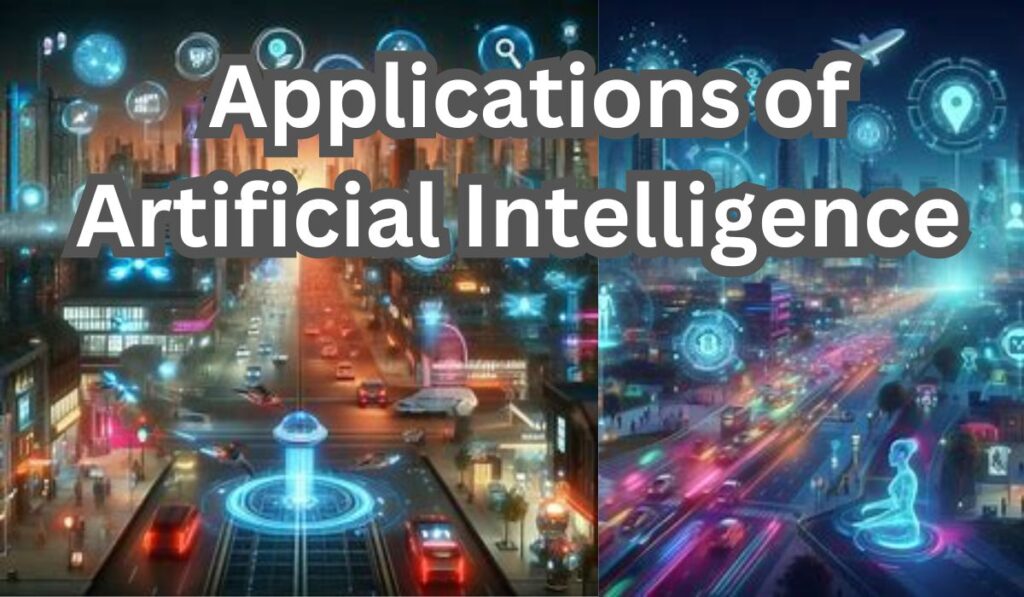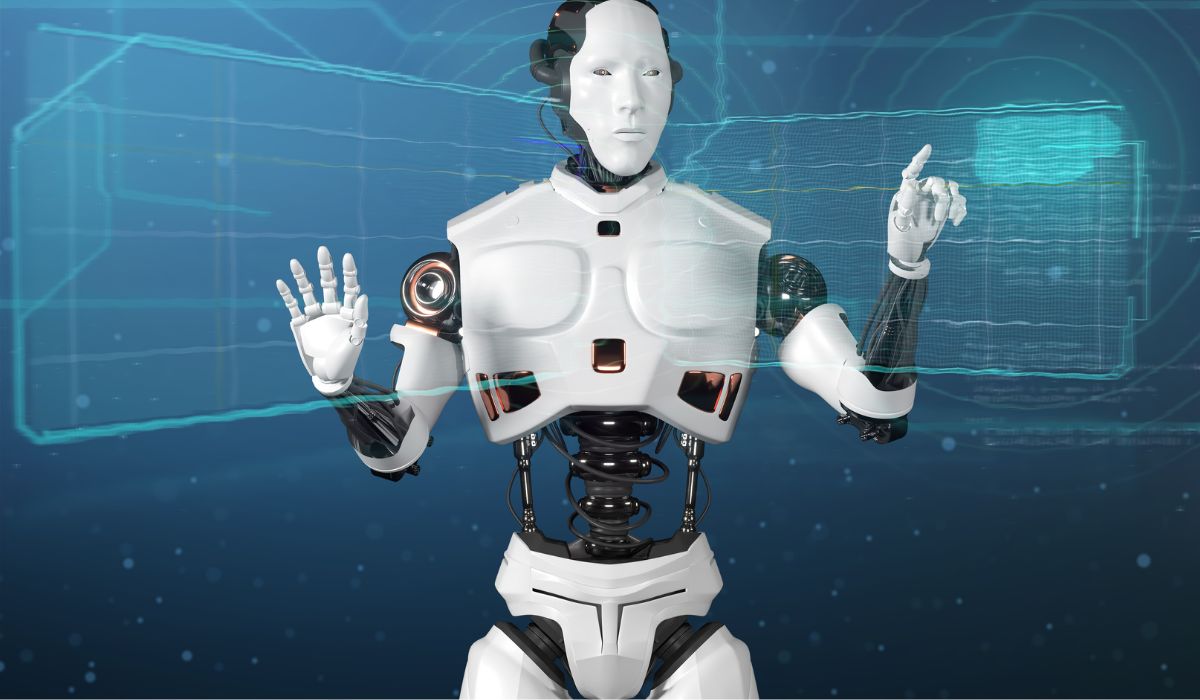Applications of Artificial Intelligence – a phrase that encapsulates the profound impact of a technology that is rapidly changing our world. From autonomous vehicles navigating our city streets, to intelligent algorithms predicting our online shopping habits, AI is no longer a futuristic concept, but a present reality.
This article aims to explore the diverse applications of AI, shedding light on how this technology is not only enhancing our lives but also shaping our future. So, whether you’re a seasoned tech enthusiast or a curious novice, join us as we delve into the fascinating world of AI and its myriad applications.
The Journey of AI
The inception of AI traces back to the mid-20th century, where visionary pioneers envisioned machines mirroring human intelligence. Today, AI seamlessly integrates into our daily lives, subtly influencing decisions from movie recommendations on Netflix to virtual assistants on smartphones.
Exploring 7 Powerful Applications of AI

This article delves into seven remarkable applications of AI, shedding light on their practical implications and transformative capabilities across various domains.
- AI in Healthcare
AI has revolutionized healthcare, optimizing patient care, disease diagnosis, and treatment strategies. Utilizing machine learning algorithms, AI assists in analyzing vast medical data to detect patterns and anomalies. For instance, AI-powered robotic surgical equipment enhances surgical precision and efficiency, while deep learning algorithms aid in cancer research by predicting patient survival rates and personalizing treatment plans.
- AI in Autonomous Vehicles
AI serves as the cornerstone of self-driving cars, enabling them to navigate complex environments and make real-time decisions. Tesla’s Autopilot system exemplifies AI integration, utilizing sensors and algorithms to perceive surroundings and control vehicle operations. Continuous learning mechanisms refine AI algorithms, enhancing safety and efficiency in autonomous driving.
- Personalized Recommendations Using AI
In e-commerce, AI-driven personalized product recommendations revolutionize the shopping experience. Leveraging customer behavior data, AI algorithms predict preferences, driving sales and customer satisfaction. Amazon’s product recommendation engine epitomizes AI’s impact, analyzing millions of customer interactions to deliver tailored suggestions.
- AI in Risk Assessment and Fraud Detection
AI augments financial processes, facilitating smarter decisions in risk assessment and fraud detection. Machine learning algorithms analyze vast financial data to identify patterns and mitigate risks. AI-driven credit scoring systems personalize credit assessments, enhancing financial inclusivity and efficiency.
- AI in Content Creation and Gaming
Entertainment industries leverage AI for content personalization and game development. Netflix’s recommendation system utilizes deep learning to predict viewer preferences, enhancing content discovery. AI-driven algorithms optimize content creation and decision-making, revolutionizing entertainment experiences.
- Role of AI in Automation and Predictive Maintenance
AI optimizes manufacturing processes, enabling automation and predictive maintenance. Smart factories employ AI for personalized production strategies and early detection of machine failures. Machine learning algorithms analyze production data, enhancing efficiency and productivity.
- AI in Agriculture
AI revolutionizes agriculture, optimizing crop monitoring and yield prediction. Precision farming techniques utilize AI-driven insights to enhance crop management and optimize resource utilization. Machine learning algorithms analyze agricultural data, empowering farmers with actionable insights for informed decision-making.
Future Prospects of AI

The future of AI holds limitless possibilities, from smart cities to advanced robotics. Continued technological advancements will unlock new applications and opportunities, shaping a future where AI drives innovation and enhances human experiences.
Conclusion: 7 Game-Changing Applications of Artificial Intelligence
AI’s pervasive influence across diverse industries underscores its transformative potential. From healthcare to agriculture, AI empowers organizations with data-driven insights, revolutionizing traditional processes and driving innovation. As we embark on a future powered by AI, its impact will continue to redefine human experiences and shape the fabric of society.
FAQs: 7 Game-Changing Applications of Artificial Intelligence
- What is Artificial Intelligence (AI)?
Artificial Intelligence (AI) is a branch of computer science dedicated to creating machines capable of mimicking human intelligence, encompassing tasks such as speech recognition, learning, planning, problem-solving, and perception.
- How is AI used in healthcare?
AI enhances healthcare by aiding in disease diagnosis, treatment planning, drug discovery, patient monitoring, and personalized medicine. It analyzes extensive medical data to identify patterns and insights beyond human capability.
- What role does AI play in autonomous vehicles?
AI serves a crucial role in autonomous vehicles, facilitating navigation, obstacle avoidance, and decision-making akin to human drivers. It integrates sensors and algorithms to perceive surroundings and ensure safe operation.
- How does AI benefit e-commerce?
AI enhances e-commerce by delivering personalized product recommendations, predicting consumer behavior, automating customer service, and optimizing inventory management. It enhances user experiences and drives sales growth.
- Can AI be used in finance?
Yes, AI finds applications in finance for credit scoring, algorithmic trading, fraud detection, and automating financial processes. It analyzes vast financial data to enhance decision-making and mitigate risks.
- How is AI changing the entertainment industry?
AI transforms the entertainment industry by personalizing content recommendations, automating content creation, enhancing gaming experiences, and optimizing content discovery. It tailors experiences to individual preferences, driving user engagement.
- What impact does AI have on manufacturing?
AI improves manufacturing efficiency by enabling automation, predictive maintenance, and optimizing production processes. It enhances decision-making through data-driven insights, streamlining operations and enhancing productivity.
- How is AI used in agriculture?
AI enhances agriculture through precision farming, crop monitoring, yield prediction, and pest detection. It leverages data analytics to optimize resource allocation and improve crop management practices.
- What are the future prospects of AI?
The future of AI is characterized by boundless innovation, spanning applications in smart cities, advanced robotics, and quantum computing. Continued advancements will unlock new opportunities, shaping a future where AI drives progress and innovation.
- Is AI a threat or an opportunity?
AI presents both opportunities and challenges, depending on its application and implementation. While it can automate certain tasks and enhance efficiency, it also raises concerns regarding ethics, privacy, and job displacement. Ultimately, AI’s impact hinges on responsible deployment and ethical considerations.
Artificial Intelligence stands as a transformative force, reshaping industries and redefining human experiences. Embracing its potential while navigating ethical considerations will pave the way for a future powered by innovation and progress.
